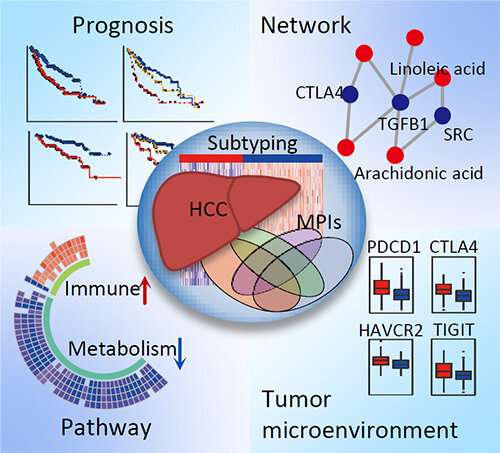Identification and characterization of robust hepatocellular carcinoma prognostic subtypes based on an integrative metabolite-protein interaction network. Credit: CHEN Di
A research group led by Prof. Piao Hailong from the Dalian Institute of Chemical Physics (DICP) of the Chinese Academy of Sciences (CAS) identified hepatocellular carcinoma (HCC) subtypes with distinctive metabolic phenotypes through bioinformatics and machine learning methods, and elucidated the potential mechanisms based on a metabolite-protein interaction network and multi-omics data.
The study, published in Advanced Science on July 11, provides insights guiding precise personalized HCC medicine.
Metabolic reprogramming, which can promote rapid cell proliferation by regulating energy and nutrient metabolism, is considered to be one hallmark of cancer. It can impact other biological processes through complex metabolite-protein interactions.
The researchers utilized complex network and machine learning methods to analyze multi-omics data and the metabolite-protein interaction network to identify hepatocellular carcinoma subtypes with significant differences in prognosis.
They identified a metabolic HCC subtype with poor prognosis, which is strongly correlated with hypoxia, hypermethylation of metabolic enzymes, down-regulation of various metabolic pathways, and accumulation of multiple fatty acids. In addition, many immune-related pathways were significantly up-regulated in this poor prognosis subtype.
Based on further analyses of metabolite-protein interactions, the researchers predicted multiple interactions between unsaturated fatty acid and immunoregulatory proteins, suggesting that unsaturated fatty acid accumulation may be one potential cause of immune pathway up-regulation.
More information: Di Chen et al, Identification and Characterization of Robust Hepatocellular Carcinoma Prognostic Subtypes Based on an Integrative Metabolite‐Protein Interaction Network, Advanced Science (2021). DOI: 10.1002/advs.202100311
Journal information: Advanced Science
Provided by Chinese Academy of Sciences
























